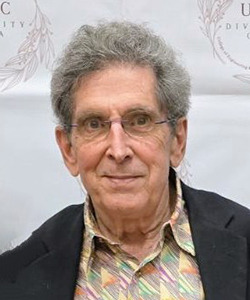Molinaroli College of Engineering and Computing
Faculty and Staff
Stephen Lloyd
| Title: | Adjunct Faculty |
| Department: | Integrated Information Technology Molinaroli College of Engineering and Computing |
| Email: | sl96@mailbox.sc.edu |
| Phone: | 803-463-6759 |
| Office: | Innovation Center Suite 1300 550 Assembly Street Columbia, SC 29208 |
| LinkedIn: | My LinkedIn profile |
| Resources: | Dr. Lloyd CV |
 Follow @@Stephen06041949
Follow @@Stephen06041949
Background
He was the initial PhD recipient from Duke University in its new Computer Science
Department in 1974. His PhD was in neural networks and the processing demands of maximally
parallel systems. He simultaneously completed his MD studies, part of a combined MD/PhD
program comprising ten percent of the medical class referred to as the Medical Scientist
Training Program. Dr. Lloyd was born in Baltimore, Maryland in 1949 and was educated
at The Johns Hopkins University (BA, 1970) and MD and PhD both from Duke University
in 1974. After his internship at the Duke Hospital, he has enjoyed a career combining
private practice with academic research.
Dr. Lloyd has published dozens of articles ranging from computerized medical record-keeping
to colorectal cancer prevention. The highlight of his academic achievement is the
publication in the April 2020 issue of the journal, Gastrointestinal Endoscopy, summarizing
the outstanding results of his 20 years of teaching and supervising more than 50 trainee
primary care colonoscopists. His work in the minority community was supported by an
NIH National Institute for Minority Health and Disparities Elimination R21 grant to
expand the training and compliance in the African American community. Another $383,000
federal grant supported the expansion of his innovations into four rural hospitals
in South Carolina. The results of his research were acknowledged by being selected
chair of the section on Colorectal Cancer of the 2013 NIH Summit of the Science of
Eliminating Racial Disparities.
After President Ronald Regan’s bout with colorectal cancer in 1982, Dr. Lloyd obtained
training in sigmoidoscopy screenings. After several years and studies indicating sigmoidoscopy
was not as protective as full colonoscopy, Dr. Lloyd expanded his knowledge base to
encompass full colonoscopy. After he and his partners successfully provided colonoscopy
screening to their patients for more than a decade, the “GI lab” in the office was
expanded to a separate outpatient endoscopy center (ASC). Over the next twenty years,
Dr. Lloyd and his 50 primary-care trainees performed more than 70,000 colonoscopies.
A recent review performed by a Mayo Clinic faculty member and the University of South
Carolina Arnold School of Public Health revealed the innovations delivered triple
the protection from subsequent colorectal cancer as the community model. The beauty
of his innovations is the rapidity in which they can be taught to a sufficient population
of existing physicians to meet the demand expeditiously. To achieve the promise of
the National Polyp Study from 1993 we must double capacity, increase compliance 50
percent and double the polyp yield of traditional colonoscopy methods. The Tandem
Team Colonoscopy technique (developed by Dr. Lloyd) satisfies each of these goals.
If adopted nationally, the innovation will save $45 billion in direct healthcare costs
and reduce the gross incidence by 75,000 cases and the mortality by 25,000 victims.
This can be achieved without training a single additional gastroenterologist, so there
are no lengthy obstacles.
In addition to his medical career, Dr. Lloyd was a multi-engine instrument rated pilot,
an equestrian (Western pleasure), and avid runner (5K through marathon). He has his
two daughters and six grandchildren who are the light of his life. He shares an interest
in ancient civilizations and the mysteries of global cataclysms (comet impacts, vulcanism,
earthquakes, and sea level changes). This teaching opportunity is an answer to a longstanding
dream. He comes from a multigenerational academic family, yet this is his first non-clinical
teaching role. I hope we all enjoy exploring the panorama of healthcare databases
and data science. I feel passionately that the students in this realm will make major
contributions to harnessing the power of artificial intelligence to eliminate the
unacceptable variability in the quality of healthcare delivered in America. With AI,
health inequities can be eliminated. Costs will plummet while health measures improve.
Millions of jobs will be created to assist patients in achieving optimal health (nursing
assistants, diet counseling, personal trainers, behavioral health therapists, navigators
and technicians to assist procedural care).
After fifty years as a Primary care Physician, I am passionate about providing medical
informatics tools at the point of care. Healthcare quality is far too variable and
especially poor among the underserved. With AI, health inequities can be eliminated.
Costs will plummet while health measures improve. Millions of jobs will be created
to assist patients in achieving optimal health (nursing assistants, diet counselors,
personal trainers, behavioral health therapists, navigators, and technicians to assist
procedural care). I hope I can share the passion of my hopes for medical informatics
and the evolution of American healthcare towards an improved system delivering value
at far less cost. The dream of precision medicine is within our grasp with the power
of AI.
Education
PhD., Duke University Graduate School, Department of Computer Science, Durham, North
Carolina
MD., Duke University Medical School, Durham, North Carolina
B.A., Natural Science, The Johns Hopkins University Baltimore, Maryland
Research Overview
Dr. Lloyd's ambition is to harness the power of AI in primary care. There is no existing learning database, so it will have to be created from scratch. Dr. Lloyd is researching chatbots to streamline data acquisition for the PCP to reduce burnout. Once the data is accumulated, autonomous care emerges. Similar to autonomous driving, the key is an accurate, unbiased learning file. Once invoked, the role of the PCP will be transformed to manage whole person health and wellbeing.